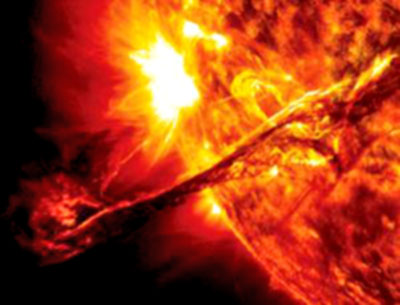http://www.bibliotecapleyades.net/cienc ... _sol58.htm
Waiting for solar fireworks to reach a grand finale next year?
Um..., sorry, looks like you already missed them. Structures in the sun's corona indicate that the peak in our star's latest cycle of activity has been and gone, at least in its northern hemisphere.
The southern hemisphere, meanwhile, is on a sluggish rise to solar maximum and may not hit its peak until 2014.
This bizarre asymmetry strengthens a theory that has been bubbling among sun watchers for the past few years: our star is headed for hibernation. Having the sun's outbursts turned off for a while would provide a better baseline for studying how they influence Earth's climate.
Observations of magnetic footprints called sunspots revealed in the 1800s that the sun moves through a roughly 11-year cycle of activity. Around a solar maximum, the star ramps up production of sunspots, flares and ejections of plasma. During a solar minimum, things quieten down.
Following an unexpectedly deep minimum from 2008 to 2010, solar physicists predicted a weak maximum for 2013. These days, though, sunspots aren't the only tools for charting the solar cycle.
Richard Altrock of the US Air Force Research Laboratory in New Mexico has been studying coronal structures called polar crown prominences, which stem from magnetic rumblings on the sun's surface.
These gaseous filaments form at mid-latitudes at the beginning of a solar cycle.
As it progresses they drift polewards, and when they reach 76 degrees latitude, a solar maximum has arrived. Soon afterwards the prominences disappear, only to form again during the next cycle.
Based on the movements of this cycle's prominences, Altrock says that an especially weak solar maximum took place in the sun's northern hemisphere around July last year (arxiv.org/abs/1209.2969).
Bernhard Fleck, project scientist for NASA's and the European Space Agency's Solar and Heliospheric Observatory, calls the paper solid work, but adds that even if we missed the northern maximum, the southern hemisphere is still expected to put on a show.
According to Altrock, the southern prominences are still on the move, but slowly. If they continue at the current rate, he says, the south will not reach its maximum until February 2014.
Such a large asymmetry between hemispheres could be a sign of big changes ahead, says Steven Tobias, a mathematician at the University of Leeds, UK, who models what drives the sun's magnetic field.
According to his models, such a situation precedes an extended quiet phase called a grand minimum.
"Changes in symmetry are more indicative of going into a grand minimum than the strength of the cycle," he says.
Grand minima can last for decades.
The previous one took place between 1645 and 1715, and has been linked to the little ice age in Europe. A new one might also cause localised cold periods, but many climate scientists see a silver lining to such a turn of events: a grand minimum offers ideal conditions for testing the effects of solar variability on Earth's climate (see "Our star's subtle influence").
But Michael Proctor, a solar physicist at the University of Cambridge, is not convinced that this will happen. "This present cycle is similar to the weak one that ended in 1913, and that was followed by a strong cycle," he says.
Only time will tell.
